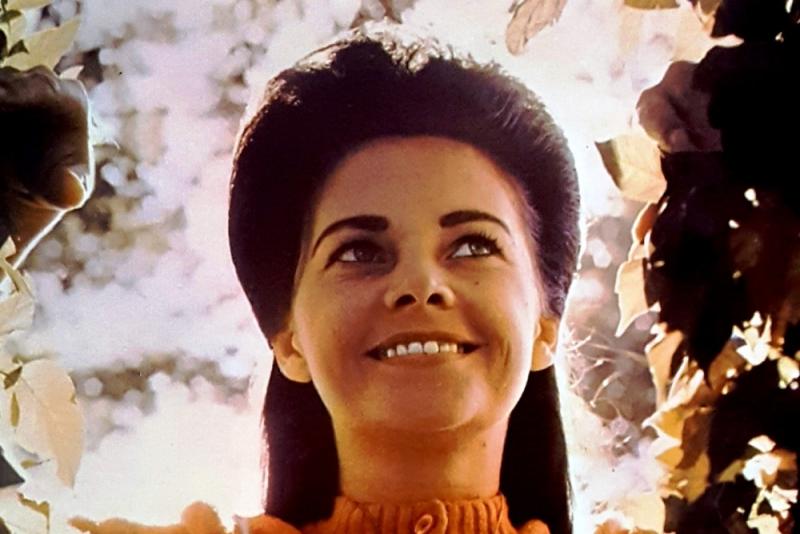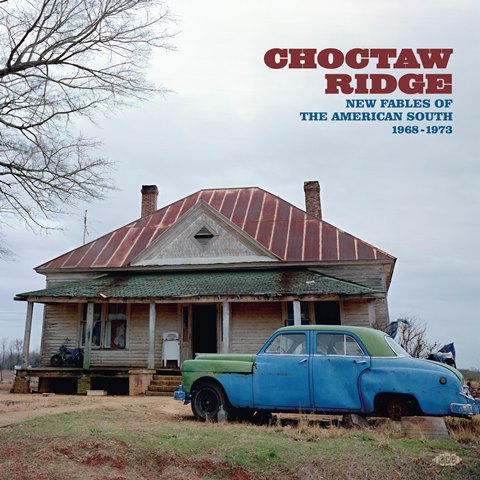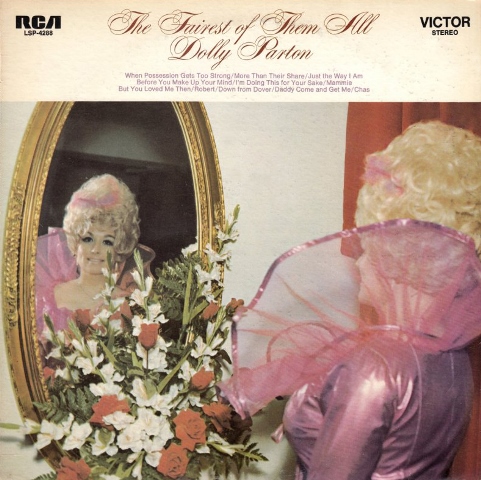Reissue CDs Weekly: Choctaw Ridge - New Fables of The American South 1968-1973 | reviews, news & interviews
Reissue CDs Weekly: Choctaw Ridge - New Fables of The American South 1968-1973
Reissue CDs Weekly: Choctaw Ridge - New Fables of The American South 1968-1973
Must-have collection celebrating the revitalisation of country music story telling

“Saunders' Ferry Lane” elegantly paints a picture of revisiting an empty, out-of-season neighbourhood to reflect on an old relationship. It’s cloudy and begins raining. The grass where the couple lay is dead. Birds have flown away. The gentle arms which held the narrator are gone. “I find no present comfort for my pain” sings a forlorn Sammi Smith.
Discomfort of a different kind is addressed by Billie Jo Spears’ up-tempo “Mr Walker, It's All Over.” After leaving Garden City, Kansas for New York to work, she fetches coffee for Walker and helps him dodge his wife. Office guys have “overfamiliar thoughts on their minds....a lot of hands reaching out to grab what I consider mine.” The company president pursues her even though his hair is turning white. Her Greenwich Village apartment is infested. She doesn’t like the New York secretary’s life with its sexual harassment, squalor and being treated like chattel. A return to Kansas is inevitable.
 Both pithy vignettes crop up on Choctaw Ridge – New Fables Of The American South 1968–1973, a 24-track collection exploring “a golden era for an atmospheric, inclusive and progressive country music.” Specifically, it’s a sound “that emerged at the end of the 60s in the wake of Bobbie Gentry’s ‘Ode to Billie Joe’.” A fantastic collection and defining statement, nothing on it is throw-away. All the singers had something to say. Every song is a winner. The inspirational Gentry is here with “Belinda.”
Both pithy vignettes crop up on Choctaw Ridge – New Fables Of The American South 1968–1973, a 24-track collection exploring “a golden era for an atmospheric, inclusive and progressive country music.” Specifically, it’s a sound “that emerged at the end of the 60s in the wake of Bobbie Gentry’s ‘Ode to Billie Joe’.” A fantastic collection and defining statement, nothing on it is throw-away. All the singers had something to say. Every song is a winner. The inspirational Gentry is here with “Belinda.”
Compiled by Martin Green (last encountered by this column through his double-CD Super Sonics - Martin Green Presents 40 Junkshop Britpop Greats) and Saint Etienne’s Bob Stanley, Choctaw Ridge makes so much sense it’s impossible not to wonder why it hasn’t been done before. New context is brought. In this setting, Kenny Rogers & The First Edition’s overfamiliar “Ruby, Don't Take Your Love to Town” is given a new gravity. It also sounds weirder than ever – the sparse, percussive arrangement adds to the unsettling atmosphere as never before. In a Southern Gothic way, about half the collection's songs shock.
There are singers and singer-songwriters central to Nashville’s ecosystem: Dolly Parton (with her own song, the devastating “Down From Dover”), Jeannie C Riley, Sammi Smith and Billie Jo Spears. Others had brushes with pop, in its widest sense: polymath music biz insider Lee Hazlewood, ex-Monkee Michael Nesmith and former New Christy Minstrels’ bassist Kenny Rogers. They join singer-songwriters carving their own, cross-genre, paths: the Queens, New York-raised Chris Gantry, future Sly & The Family Stone associate Jim Ford, the uncategorisable John Hartford, who made an album with Miles Davis bassist Dave Holland, and swamp-rock innovator Tony Joe White. As the liner notes point out, Charlie Rich “was, at heart, a jazz pianist.” All created music chiming with the “Ode to Billie Joe” vibe; moody songs explicitly telling stories.
 This wasn’t new. Lee Hazlewood’s 1963 debut LP Trouble is a Lonesome Town spread such tales over a whole album. The ballad – in its original meaning: a narrative song with lyrics telling a story – had been pervasive in country since it was defined as a genre, and before too. The song “Little Mary Phagan” recounted how in 1913 a 14-year-old factory worker in Atlanta, Georgia was assaulted and murdered by her supervisor. It was first performed c. 1915. Earlier, “The House Carpenter” – sung by women – had arrived from Britain and originally conjured a Demonic, tempting title character. Though credited to Hoyt Axton and a hit for The Kingston Trio in 1963, “Greenback Dollar” recast the earlier songs “East Virginia” and “I Don’t Want Your Millions, Mister,” which told of a young woman who left the mountains for love. It did not work out.
This wasn’t new. Lee Hazlewood’s 1963 debut LP Trouble is a Lonesome Town spread such tales over a whole album. The ballad – in its original meaning: a narrative song with lyrics telling a story – had been pervasive in country since it was defined as a genre, and before too. The song “Little Mary Phagan” recounted how in 1913 a 14-year-old factory worker in Atlanta, Georgia was assaulted and murdered by her supervisor. It was first performed c. 1915. Earlier, “The House Carpenter” – sung by women – had arrived from Britain and originally conjured a Demonic, tempting title character. Though credited to Hoyt Axton and a hit for The Kingston Trio in 1963, “Greenback Dollar” recast the earlier songs “East Virginia” and “I Don’t Want Your Millions, Mister,” which told of a young woman who left the mountains for love. It did not work out.
What was new as the Sixties closed were songs composed to reflect the themes of the day, and then recording them in styles which – although country – didn’t fit or reflect Nashville templates. The arrangements of the 1968 hit versions of the Jimmy Webb songs “MacArthur Park” and “Wichita Lineman” are critical to what’s on Choctaw Ridge, as is their lyrical ambiguities. It's not obvious what they are about, and the pay-offs aren’t explicit. In 1967, “Ode to Billie Joe” had already delineated this thematic opacity.
It all added up to records which were fresh, records which didn’t replicate the familiar. Fittingly, Choctaw Ridge - New Fables of The American South 1968-1973 is a compilation with a fresh perspective, one which doesn’t replicate the familiar. So far this year, it’s the best multi-artist – Linda Smith’s Till Another Time is the reason it’s “multi-artist” – archive compilation to hit the shops. A must-have.
- Next week: Complete works in one place – I Stand Accused: The Complete Merseybeats and Merseys Sixties Recordings and Pink, Purple, Yellow & Red: The Complete Sorrows
- More reissue reviews on theartsdesk
- Kieron Tyler’s website
Share this article
The future of Arts Journalism
You can stop theartsdesk.com closing!
We urgently need financing to survive. Our fundraising drive has thus far raised £49,000 but we need to reach £100,000 or we will be forced to close. Please contribute here: https://gofund.me/c3f6033d
And if you can forward this information to anyone who might assist, we’d be grateful.

Subscribe to theartsdesk.com
Thank you for continuing to read our work on theartsdesk.com. For unlimited access to every article in its entirety, including our archive of more than 15,000 pieces, we're asking for £5 per month or £40 per year. We feel it's a very good deal, and hope you do too.
To take a subscription now simply click here.
And if you're looking for that extra gift for a friend or family member, why not treat them to a theartsdesk.com gift subscription?
more New music
 Album: Mulatu Astatke - Mulatu Plays Mulatu
An album full of life, coinciding with a 'farewell tour'
Album: Mulatu Astatke - Mulatu Plays Mulatu
An album full of life, coinciding with a 'farewell tour'
 Music Reissues Weekly: Sly and the Family Stone - The First Family: Live At Winchester Cathedral 1967
Must-have, first-ever release of the earliest document of the legendary soul outfit
Music Reissues Weekly: Sly and the Family Stone - The First Family: Live At Winchester Cathedral 1967
Must-have, first-ever release of the earliest document of the legendary soul outfit
 Album: Robert Plant - Saving Grace
Mellow delight from former Zep lead
Album: Robert Plant - Saving Grace
Mellow delight from former Zep lead
 Brìghde Chaimbeul, Round Chapel review - enchantment in East London
Inscrutable purveyor of experimental Celtic music summons creepiness and intensity
Brìghde Chaimbeul, Round Chapel review - enchantment in East London
Inscrutable purveyor of experimental Celtic music summons creepiness and intensity
 First Person: Musician ALA.NI on how thoughts of empire and reparation influenced a song
She usually sings about affairs of the heart - 'TIEF' is different, explains the star
First Person: Musician ALA.NI on how thoughts of empire and reparation influenced a song
She usually sings about affairs of the heart - 'TIEF' is different, explains the star
 Album: NewDad - Altar
The hard-gigging trio yearns for old Ireland – and blasts music biz exploitation
Album: NewDad - Altar
The hard-gigging trio yearns for old Ireland – and blasts music biz exploitation
 Album: The Divine Comedy - Rainy Sunday Afternoon
Neil Hannon takes stock, and the result will certainly keep his existing crowd happy
Album: The Divine Comedy - Rainy Sunday Afternoon
Neil Hannon takes stock, and the result will certainly keep his existing crowd happy
 Music Reissues Weekly: Robyn - Robyn 20th-Anniversary Edition
Landmark Swedish pop album hits shops one more time
Music Reissues Weekly: Robyn - Robyn 20th-Anniversary Edition
Landmark Swedish pop album hits shops one more time
 Album: Twenty One Pilots - Breach
Ohio mainstream superstar duo wrap up their 10 year narrative
Album: Twenty One Pilots - Breach
Ohio mainstream superstar duo wrap up their 10 year narrative
 Album: Ed Sheeran - Play
A mound of ear displeasure to add to the global superstar's already gigantic stockpile
Album: Ed Sheeran - Play
A mound of ear displeasure to add to the global superstar's already gigantic stockpile
 Album: Motion City Soundtrack - The Same Old Wasted Wonderful World
A solid return for the emo veterans
Album: Motion City Soundtrack - The Same Old Wasted Wonderful World
A solid return for the emo veterans
 Album: Baxter Dury - Allbarone
The don diversifies into disco
Album: Baxter Dury - Allbarone
The don diversifies into disco

Add comment